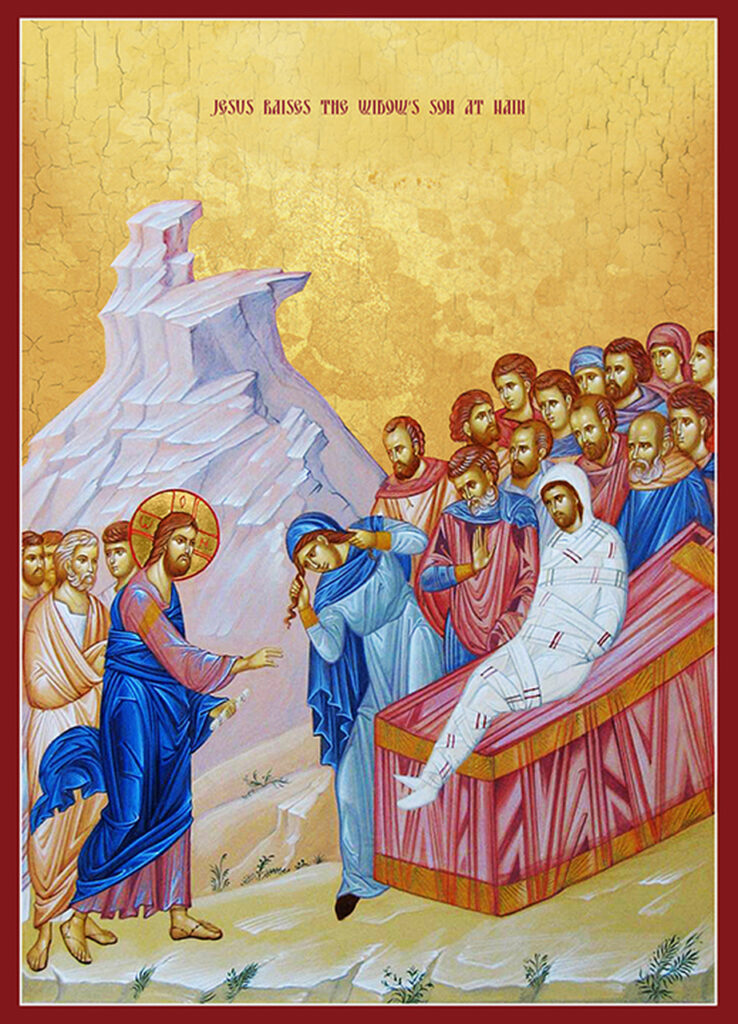In the name of the Father, and of the Son, and of the Holy Spirit, one God, Amen.
“Lord,” I cry out, “raise me up, for I am fallen and feel as a dead man.” And there is no angel sent to my comfort, no Voice from Heaven to bless me, no Sign that he has heard my cry. I want God to act in my life to perform miracles on demand, to be my constant help and support, to act so that I do not have to do so myself: because such is not the way of God, is not according to our practice, since we have been told, “You shall not put the Lord your God to the test.” (Matthew 4:7, Deuteronomy 6:16) God does not exist for my own benefit, rather I exist that I might glorify my Creator.
Yet the Lord does work miracles. Here, outside Nain, the Lord has compassion and acts—works a great miracle—not for the sake of the man but for his mother, “And when the Lord saw her, he had compassion on her and said to her, ‘Do not weep.’” And I must take this and apply it to me: when the Lord works a miracle in my life, which he does regularly and he does often, it is not for my own benefit, it is for the benefit of another; I am not worthy that the Lord perform a sign, I must not take credit and boast in the many blessings I receive, but I should give glory to God and rejoice there is another for whom the Lord has worked the miracle.
The man here was carried out by the four elements of this world, born on the wood—the means by which the Satan ensnared our ancestors—and is carried to death. And the elements of this life can only lead us to death. Yet the Son of the Virgin comes to the Son of the Widow and touches not the man but the wood, and the four elements are brought to a stop. “And he came and touched the bier, and the bearers stood still.” And by bringing his presence to the wood, here in a temporary way whereas at the Cross in a permanent way for all time, the means of our ensnarement becomes the means of Life.

My dear brothers and sisters in Christ, we want miracles in our lives—we want magical tricks and good-luck charms—and these happen regularly and often when we open our eyes to all the Lord grants us, but these are for the benefit of others and for us to glorify God. Let us, therefore, glorify God who became incarnate for us, was crucified and arose for us, that we may be brought to eternal Life and be united with him.
That we may offer true worship to our Lord and Saviour Jesus Christ, who through the wood of the Cross has defeated the Satan, together with his unoriginate Father and the All-holy, Good and Life-giving Spirit. Amen.
Brethren, it is the God who said, “Let light shine out of darkness, ” who has shone in our hearts to give the light of the knowledge of the glory of God in the face of Christ. But we have this treasure in earthen vessels, to show that the transcendent power belongs to God and not to us. We are afflicted in every way, but not crushed; perplexed, but not driven to despair; persecuted, but not forsaken; struck down, but not destroyed; always carrying in the body the death of Jesus, so that the life of Jesus may also be manifested in our bodies. For while we live we are always being given up to death for Jesus’ sake, so that the life of Jesus may be manifested in our mortal flesh. So death is at work in us, but life in you. Since we have the same spirit of faith as he had who wrote, “I believed, and so I spoke, ” we too believe, and so we speak, knowing that he who raised the Lord Jesus will raise us also with Jesus and bring us with you into his presence. For it is all for your sake, so that as grace extends to more and more people it may increase thanksgiving, to the glory of God.
— Second Corinthians 4:6–15
At that time, Jesus went to a city called Nain, and his disciples and a great crowd went with him. As he drew near to the gate of the city, behold, a man who had died was being carried out, the only son of his mother, and she was a widow; and a large crowd from the city was with her. And when the Lord saw her, he had compassion on her and said to her, “Do not weep.” And he came and touched the bier, and the bearers stood still. And he said, “Young man, I say to you, arise.” And the dead man sat up, and began to speak. And he gave him to his mother. Fear seized them all; and they glorified God, saying, “A great prophet has arisen among us!” and “God has visited his people!
— Luke 7:11–16
